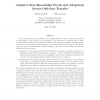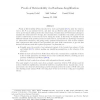TCC
2009
Springer
14 years 5 months ago
2009
Springer
In the setting of secure computation, a set of parties wish to securely compute some function of their inputs, in the presence of an adversary. The adversary in question may be st...
TCC
2009
Springer
14 years 5 months ago
2009
Springer
Proofs of Retrievability (PoR), introduced by Juels and Kaliski [JK07], allow the client to store a file F on an untrusted server, and later run an efficient audit protocol in whi...
TCC
2009
Springer
14 years 5 months ago
2009
Springer
The concept of witness-hiding suggested by Feige and Shamir is a natural relaxation of zero-knowledge. In this paper we identify languages and distributions for which many known co...
TCC
2009
Springer
14 years 5 months ago
2009
Springer
Predicate encryption is a new encryption paradigm which gives a master secret key owner fine-grained control over access to encrypted data. The master secret key owner can generat...
TCC
2009
Springer
14 years 5 months ago
2009
Springer
Verifiable random functions (VRFs), introduced by Micali, Rabin and Vadhan, are pseudorandom functions in which the owner of the seed produces a public-key that constitutes a commi...
TCC
2009
Springer
14 years 5 months ago
2009
Springer
The known secret-sharing schemes for most access structures are not efficient; even for a one-bit secret the length of the shares in the schemes is 2O(n) , where n is the number of...
TCC
2009
Springer
14 years 5 months ago
2009
Springer
We present the first hierarchical identity based encryption (HIBE) system that has full security for more than a constant number of levels. In all prior HIBE systems in the literat...
TCC
2009
Springer
14 years 5 months ago
2009
Springer
It is well known that general secure function evaluation (SFE) with information-theoretical (IT) security is infeasible in presence of a corrupted majority in the standard model. ...
TCC
2009
Springer
14 years 5 months ago
2009
Springer
We study the possibility of constructing encryption schemes secure under messages that are chosen depending on the key k of the encryption scheme itself. We give the following sep...
TCC
2009
Springer
14 years 5 months ago
2009
Springer
We provide a simple protocol for secret reconstruction in any threshold secret sharing scheme, and prove that it is fair when executed with many rational parties together with a s...




